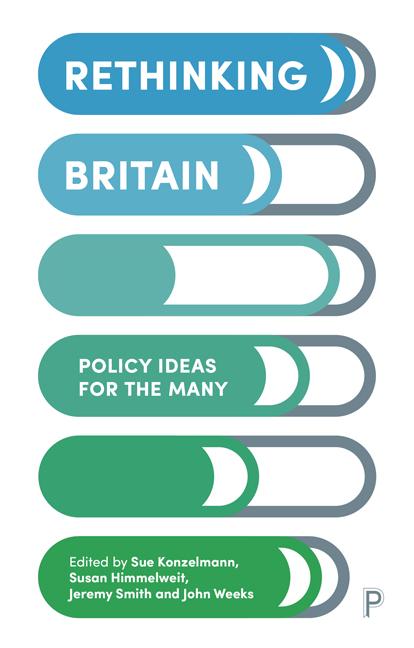Book contents
- Frontmatter
- Contents
- List of Tables and Figures
- The Contributors
- Foreword
- Introduction
- Interlude: ‘Mirror, Mirror, On the Wall – Who has the Highest Debt of All?’
- Part One Building a Full-Employment Economy: Introduction
- Part Two Public Investment – Prioritising Society Rather than Profit: Introduction
- Part Three Making Finance Work for Society: Introduction
- Part Four Genuine Social Security: Introduction
- Part Five How to provide for Social Needs: Introduction
- Conclusion
- Jargon Busters
- References and Further Reading
- Index
1 - How can we Tackle the UK’S Private Debt Crisis?
Published online by Cambridge University Press: 11 March 2021
- Frontmatter
- Contents
- List of Tables and Figures
- The Contributors
- Foreword
- Introduction
- Interlude: ‘Mirror, Mirror, On the Wall – Who has the Highest Debt of All?’
- Part One Building a Full-Employment Economy: Introduction
- Part Two Public Investment – Prioritising Society Rather than Profit: Introduction
- Part Three Making Finance Work for Society: Introduction
- Part Four Genuine Social Security: Introduction
- Part Five How to provide for Social Needs: Introduction
- Conclusion
- Jargon Busters
- References and Further Reading
- Index
Summary
What's the issue?
There is growing public policy concern over the historically unprecedented level of household debt, but little by way of proposed solutions to deal with it.
Is this level of private household debt a problem requiring action by an incoming progressive government? Can public policy address such unprecedented levels of household debt?
Analysis
Current high household debt levels are the result of over two decades of promoting finance-led growth, in which easy credit fuelled asset bubbles and drove consumer demand despite stagnant wage growth.
Finance-led growth refers to the shifting pattern of accumulation from productive to financial activities since the 1980s. The 2008 global finance crisis exposed the fragile balancing act required to manage finance-led growth. The basic contradiction lies in rapidly growing private debt stock and stagnating income flows.
A finance-led growth model requires private debt to generate demand that would not otherwise be there. This demand drives up property prices and fuels consumer spending through more indebtedness and persistently stagnant wage incomes.
Understanding how finance-led growth operates requires recognising that banks create money by opening debt deposit accounts when new loan contracts are issued. Efforts since the crisis to replenish capital reserves and focus on macro-prudential regulation have not changed the unrivalled commercial power of banks to create money by issuing new loans. Banks then bundle together and resell loan contracts multiple times across global financial markets. The original debt and all subsequent claims to the interest payments on that debt are wholly dependent on current incomes of households to keep up repayments. This ‘originate and distribute’ retail banking business model, which caused the 2008 financial crisis, remains largely unchanged.
The size and scope of household debt is an economic and societal problem, but with little recognition at public policy level.
Figure 7 shows the total stock of debt owed by the household sector, £1.545 trillion, of which 86 per cent was mortgage debt (£1.344 trillion). Public policy has promoted home ownership as a means of making households responsible for their own future needs. Households are presumed to accumulate savings in the value of their primary residence, which as they grow older provides a cash reserve at times of need and income flow for retirement. These assumptions largely ignore that residential property has become a highly leveraged form of investment because house price increases are fuelled by cheap credit.
- Type
- Chapter
- Information
- Rethinking BritainPolicy Ideas for the Many, pp. 141 - 146Publisher: Bristol University PressPrint publication year: 2019



